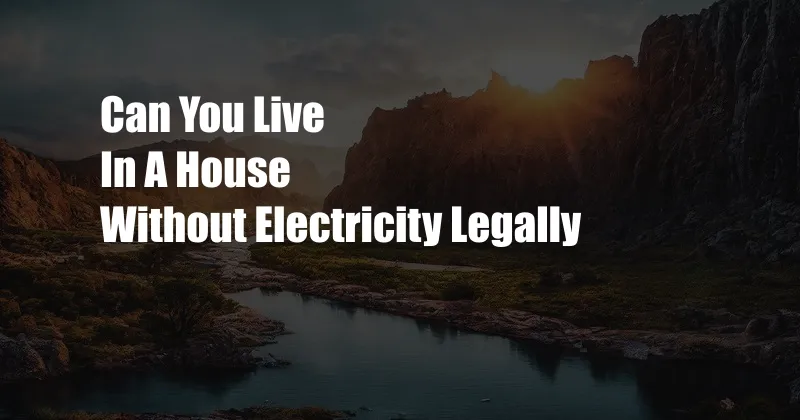
Can You Legally Live in a House Without Electricity?
In an era where electricity permeates every aspect of our lives, it’s easy to take its presence for granted. But what if you found yourself in a situation where you had to live without this modern convenience? Would it be legal, and what challenges would you face? Let’s delve into this intriguing topic.
Legal Considerations
Yes, it is generally legal to live in a house without electricity in the United States. The government does not mandate that all homes have electricity. However, some local ordinances or building codes may have specific requirements regarding electrical systems, especially in newly constructed homes. It’s always advisable to check with your local building department for any regulations that may apply.
Challenges of Living Without Electricity
While living without electricity may be legal, it presents numerous challenges that can significantly impact your daily life. Here are some of the obstacles you might encounter:
- Water Source: Most modern water pumps rely on electricity to function. Without power, you may need to find alternative water sources, such as a nearby well or rainwater collection system.
- Heating and Cooling: Electricity is often used for heating and cooling homes through appliances like furnaces, heat pumps, and air conditioners. Without these systems, you may need to rely on firewood, solar panels, or alternative heating methods.
- Cooking: Many modern cooking appliances, such as stoves, ovens, and microwaves, require electricity to operate. You may need to use a gas stove or a wood-burning stove for cooking.
- Lighting: Of course, electricity is essential for providing light in our homes. Without it, you’ll need to rely on candles, flashlights, or solar lamps.
- Communication: Most forms of communication, including telephones, computers, and internet services, require electricity. If you need to stay connected, you may need to seek alternative methods, such as battery-powered radios or satellite phones.
Benefits of Living Without Electricity
While living without electricity can be challenging, it can also offer some potential benefits:
- Lower Expenses: Your utility bills will be significantly reduced by eliminating electricity consumption.
- Reduced Environmental Impact: By relying on alternative energy sources, you can minimize your carbon footprint and contribute to environmental sustainability.
- Simplified Lifestyle: Living without electricity can encourage a more self-sufficient and less reliant lifestyle, fostering a greater connection with the natural world.
Tips for Living Without Electricity
If you’re considering living without electricity, here are some tips to help you prepare:
- Invest in alternative energy sources: Explore options like solar panels, wind turbines, or biogas systems to generate your own power.
- Upgrade your water filtration system: Ensure you have a reliable water source and a way to filter and purify it for consumption.
- Learn basic survival skills: Know how to build a fire, cook outdoors, and grow your own food, if necessary.
- Prepare for emergencies: Have a plan in place for emergencies, including backup supplies of food, water, and medical supplies.
FAQs
Q: Is it illegal to build a house without electricity?
A: No, it is not illegal to build a house without electricity in the United States. However, some local regulations may require certain electrical features.
Q: Can I live off the grid without electricity?
A: Yes, it is possible to live off the grid without electricity. However, it requires significant preparation, investment in alternative energy sources, and a willingness to live a more self-sufficient lifestyle.
Q: What are the advantages of living without electricity?
A: Benefits include lower expenses, reduced environmental impact, and a simplified lifestyle.
Conclusion
Whether or not to live without electricity is a personal choice that depends on your circumstances and preferences. While it presents challenges, it can also offer unique opportunities for self-sufficiency and a connection to a simpler way of life. If you’re considering living electricity-free, research thoroughly, prepare accordingly, and embrace the challenges with an open mind.
Are you intrigued by the idea of living without electricity? Share your thoughts and experiences in the comments below!